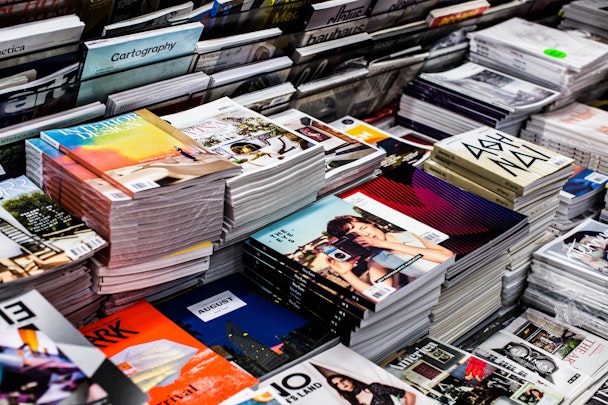‘Marketing is about being interruptive’: Redwood BDDO’s Colin Kennedy on editing Empire
These days, Colin Kennedy is chief exec at creative shop Redwood BBDO. Before joining the ad scene, he cut his teeth in the world of magazines as editor of publications including Smash Hits, FHM and legendary movie mag Empire. For The Drum’s Creativity in Focus Deep Dive, we sat down with Kennedy to talk literary ambition, his one career mistake, creative freedom and 90s nostalgia.

Colin Kennedy, CEO of Redwood BBDO, shares lessons from editing Empire Magazine / Charisse Kenion via Unsplash
Hi Colin. Did you go into magazines straight after university?
Pretty much, after bumming around a bit. I tried to write the great American novel – but I wasn’t American, it wasn’t great, and the whole idea was entirely novel.
What would the book have been – Infinite Jest?
I was into that sort of thing. I wrote a collection of short stories, but I never got it to a standard that I thought was publication-worthy.
I just knew that I was not as good as the people I wanted to write like. Whether I was good enough to be published, the jury’s out on that.
Who were you trying to emulate?
I did my thesis on Thomas Pynchon, Joseph Heller and Kurt Vonnegut, and I was reading Don DeLillo. Underworld was the big book of the time; I liked that high-comic, absurdist, Fantasia-drama mode, but I didn’t have the imagination. And I didn’t have, frankly, the sense to lower my ambition. It was a bit like, “I can’t be Maradona, so I don’t want to play football.”
So on from novels to... propaganda?
I spent a short while as what we now call a propagandist, working for a Bahraini-funded research center. We’d get up early and go through the papers looking for western coverage of Middle Eastern affairs, and distill it to make it more palatable for people in Bahrain and the Gulf.
It was an opportunity to read a lot of journalism, distill it and push it back out on a tight timeline. We’d be up at 6.30am in the morning and have until midday, when the Middle East would start its day.
Decent training for when you started at Smash Hits...
I volunteered to be an interview subject for someone at Smash Hits for a piece about bad jobs, which I’d had a lot of. At college I’d been ‘the film guy,’ so I started doing 50-word reviews for them, later becoming TV and films editor.
I remember going in for an interview and being met by two scruffy kids, and asking, “When does the interview start? When do the adults arrive?” They said, “No no, we’re the decision-makers.”
It was an old-school closet office; a completely separate world, no adults allowed. It felt more like a clubhouse than an office – organized chaos with its own codes of behavior and rules of conduct. It was a very successful business at that point and there were adults in charge, but they were behind the scenes a couple of floors away.
I’m trying to recreate that clubhouse feel right now. We don’t want to be a creative agency, we want to be an agency of creatives.
In magazines, those spaces probably still exist, but they’re rarer...
The late 90s was the peak for magazines and youth culture. It was a hits business. [Smash Hits publisher] EMAP would bring out Heat or Grazia or FHM and those hits would would lift everything else. That allowed for long leashes. They didn’t want the suits in charge because they didn’t want to mess with a magic formula.
Once that industry became more digital, it stopped being a money-making machine and the accountants got involved. They couldn’t turn the revenue tap back on, so they introduced cost control, which has a negative impact on culture.
How dewy-eyed do you feel about that dead magazine culture?
We used to have our issue meetings in the pub. We’d be there for the day, and back the next day for an issue meeting.
We published fortnightly, which is a terrible rhythm. You do nothing for a week, and then cram for a week. It was like exam pressure, a permanent essay-night crisis.
We’ve got to talk about Empire too.
I went there in 2000 as features editor. I hadn’t really looked at the masthead, and features editor was effectively second in command. The editor went on maternity leave around the summer of 2001, [leaving me in charge for what] happened to be the worst round of blockbusters: Tim Burton’s Planet of the Apes, Tomb Raider ... It was just flop after flop.
Your editorship there was during a transitional period for the magazine industry.
With the advent of the internet, people started watching trailers online. The only way a monthly periodical could keep up was to get ahead. We made a deliberate strategy to go as early as possible with the films that had the most baked-in anticipation. Empire now never puts a movie that’s out this month on the cover. With the new pace of culture, it’s no longer looking for what’s out now, it’s looking for what they should be excited about next.
We called it the ‘Christmas Eve strategy’: you might get socks in the morning, but everyone loves Christmas Eve. Same with Pearl Harbor – put it on early enough and everyone will love it.
The pace of culture has only increased since. Presumably that still affects your current role?
The tyranny of algorithms telling you what to watch next on Netflix means there’s a role for expert navigator brands, but they have to plumb into culture at the right point. Most content brands or marketing brands don’t do enough recalibration based on how culture changes. You need to continue questioning everything about how you fulfil that role.
Did you ever make a decision to leave magazines, or has your onward trajectory been more organic?
The early 2000s was the end of the magazine peak. I’ve always wanted to be where the action is, so when I was offered a job in 2005 that was purely digital [as digital creative director at Bauer], it was a leap sideways.
At that point, some magazines editors were lightly touching their websites, but it was secondary business. To go and do a pure digital job was like a premiership football player going to the rugby league. But it was where the action was.
Legacy publishers found it harder to make money from digital than they anticipated. The commitment of legacy media to digital wobbled in a very predictable pattern.
My only career mistake was when I got caught up in that. I was pulled back into edit FHM, which was past its peak. I should have stuck with digital, and actually had some pretty good success on fhm.com. But I couldn’ t do anything about the magazine.
Is there still a magazine editor feel to the work you do now?
Pretty early on, I had this feeling that creative companies should be led by creative leaders. When the publisher of Empire moved on, I said, “I don’t want you to put another publisher above my head, I want to be editor-publisher.” It’s vital to create the right conditions for creativity to happen. I didn’t want to be captain on the field if the manager in the dugout was playing a different strategy.
I want to be a creative leader, and encourage my creatives to be leaders: to be out front, taking briefings from clients, listening to their feedback, being in the room without having to be babysat.
The other thing I’ve kept with me from magazines is trying to be connected to culture, and to add value to the conversation. Marketing is about being interruptive ... I’m looking for creative ideas, content and franchises that advance the conversation where people don’t just tolerate them, but seek them out and share them.
How does the editor in you appear in your work?
I used to say, jokingly, that the role of an editor is to say, “this is what I want,” and then a little bit later, “that’s not what I asked for.”
You want to empower people to go in a different direction. Don’t bring me what I asked for; bring me something different and better. My job is to open up the opportunity space for you, but I’m not going to have the right idea.
When an editor comes to a creative meeting super-prepared, super-serious and super-directional, that’s not much of a meeting. You might as well just hand out marching orders. I still deliberately go into most creative meetings under-prepared and open. I make it a policy to say something really stupid early on, to create permission to fail.
How does that influence your creative process at Redwood?
Creativity is non-linear problem solving. If you go into a meeting, and it’s lots of BS, you might take a good idea and ratchet it up a few notches. But you don’t get transformational ideas from that process.
At Smash Hits we were coming up with ideas for a boyband cover. A colleague suggested we do a sugar paper cover because the band was good enough to eat. He took the conversation somewhere completely different.
Would you bring back that 90s magazine culture if you could?
I wish that those magazines still existed. I wish that education still existed for young talent. Not because of the liquid lunches and early finishes, but for that dizzying part of your early media career, where the borderline between what’s work and what’s play is unclear.
The offer that media made to young people was fairer then. If we’re going to win the war on talent (terrible phrase) we’re going to have to attract the best people to come work in marketing. We need to find the fun for them. Maybe that’s slightly different than in late 90s. But we need to find an analog for it.
To keep up to date with all our coverage head over to the Creativity in Focus hub.
Content created with:

Redwood BBDO
➤ A new type of integrated digital marketing, with true stories at the ♥ of the matter. Powerful storytelling engages consumers across the P2P and beyond �...
Find out more
